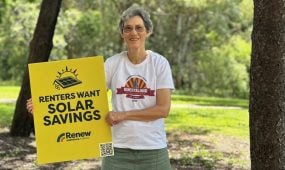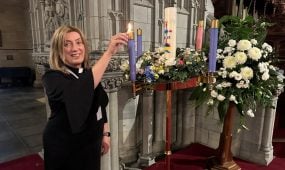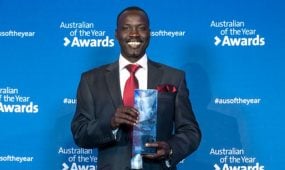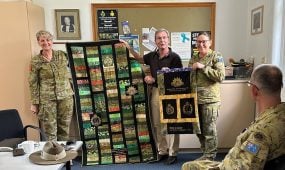Q&A with former Army serviceperson, parish priest and new chair of the local ABM committee, The Rev’d Eron Perry
Spotlight Q&A
Meet Eron Perry and find out about his ministry as a priest, which people of faith inspire him the most, the kindest gesture he has witnessed and what book he has given away the most and why
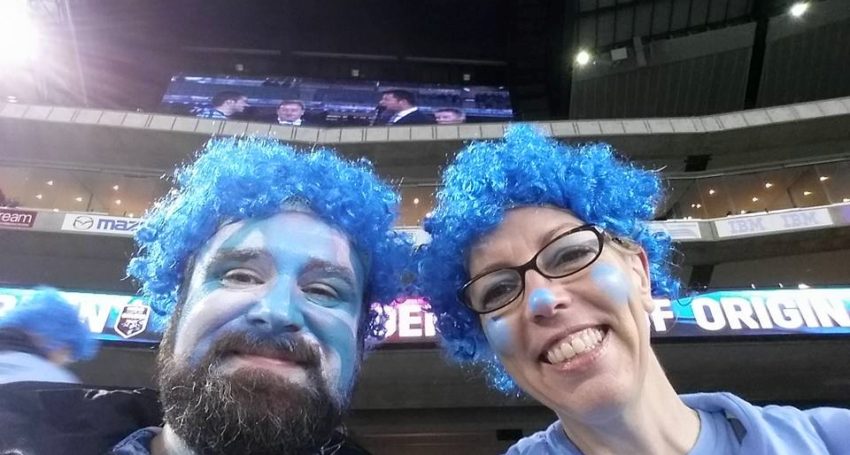
The Rev’d Eron Perry is the Parish Priest at Burleigh Heads on the Gold Coast and has recently been appointed by Archbishop Phillip Aspinall as the new Chairperson for the ACSQ Anglican Board of Mission (ABM) Committee. Eron moved to our Diocese in late 2017 following 16 years in the Grafton Diocese. After serving in the Australian Army he studied Environmental Science and then Theology. He has served in parish ministry for over 18 years and during that time has refined his taste in coffee to such a level that he is proud to be called a ‘coffee snob’ by his friends.
Where do you currently live and where do you worship?
I live and worship at Burleigh Heads on the Gold Coast.
How long have you been involved in the Anglican Church and in what roles?
I’m a cradle Anglican and am soon approaching 20 years of ordained ministry. Most of my ministry has been based in NSW, particularly in the Grafton Diocese. In my younger years I served as a youth leader and on Parish Council.
What are your current roles, including any voluntary roles, and what do your roles involve?
I’m currently the Priest-in-Charge of Burleigh Heads Anglican Church on the beautiful southern Gold Coast. I’m also part of the national ABM Development Committee and recently the Archbishop appointed me as the Chairperson of the ACSQ ABM Committee.
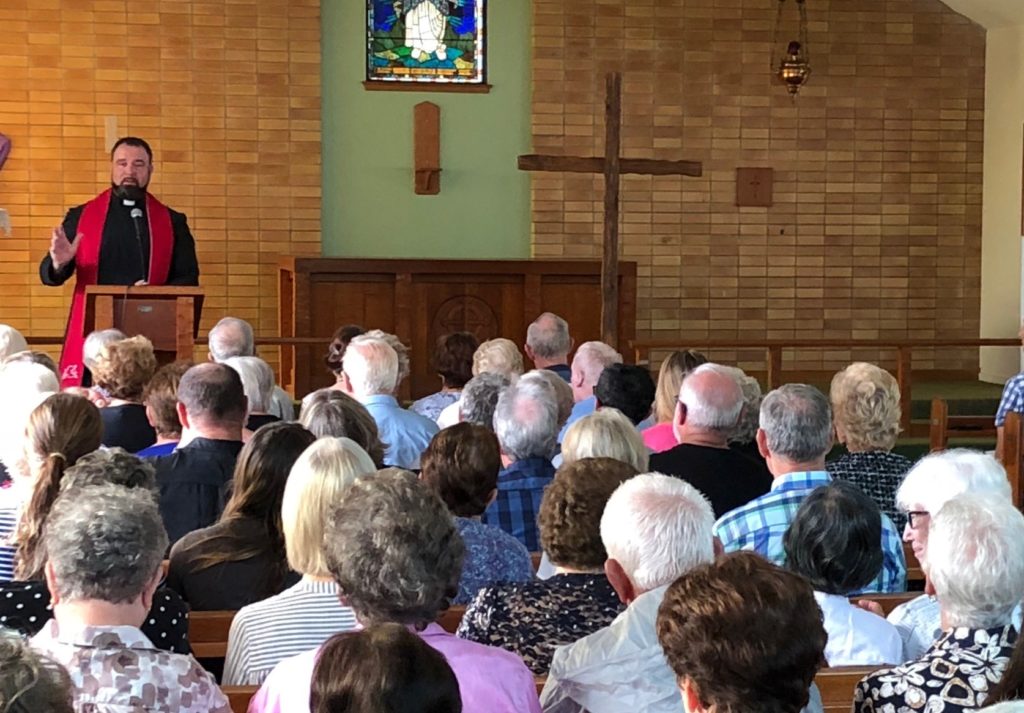
Ecumenical Good Friday service at Burleigh Heads Anglican Church, with The Rev’d Eron leading the stations of the cross service, 2018
What ministry projects and/or activities are you currently working on?
Like many leaders within the Church I’m currently spending a lot of time trying to figure out what ministry looks like in a dramatically changing environment and how to best advance mission and ministry in a ‘hybrid’ model of church. Recently the Archbishop asked the ACSQ ABM Committee to facilitate a provincial Zoom event to update people who have been generously giving towards the Archbishop’s November Appeal. It was exciting to see various contributors from around Australia come together to provide a seamless presentation looking at mission and ministry at Newton Theological College in PNG. If we think we are ministering under challenging circumstances here in Australia, our brothers and sisters in the Anglican Church of PNG are working with far greater challenges.
Advertisement
What have been the highlights of your ministry so far?
I suppose the greatest joy and satisfaction in my ministry has been working with families over the long term. Seeing them grow in faith, life and love; meeting a young couple and working with them on their wedding, then having the privilege of baptising their children and at other times the honour of ministering with the same families through difficult times like a family tragedy. As a priest I am invited into pivotal moments in people’s lives, and I don’t take that lightly.
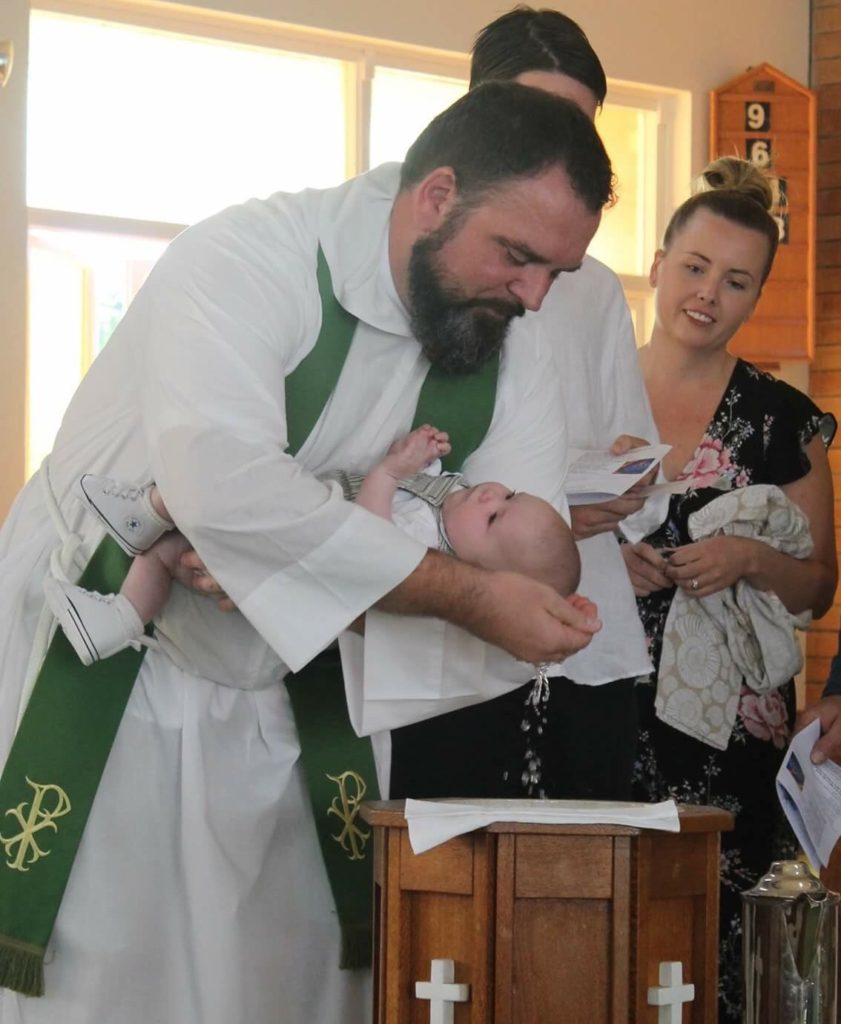
The Rev’d Eron Perry baptises Archer while proud Mum Chantal looks on, September 2018
You were recently appointed Chair of the local Anglican Board of Mission committee – can you tell us about this role and what you hope to achieve?
Yes, it is an exciting appointment. I’m still getting to know people across our Diocese, and this role is fast tracking my understanding of our Diocese and the wonderful people who make up our faith communities. ABM has been around for ages, as it’s the chief mission agency of the Anglican Church in Australia and as such there is a significant history attached to the organisation. I see part of my role as supporting the ministry of ABM within the ACSQ and to engage with its supporters old and new, especially utilising modern means of technology and social media.
Advertisement
What have been the key challenges of your roles so far and how have you worked through these?
Stepping into the role just as COVID-19 emerged in Australia was enough of a challenge in itself. Trying to get to know people and organise meetings and events in such a challenging environment was a substantial undertaking. It’s been difficult for everyone, but it adds an extra degree of challenge when you are new to a role. Fortunately, I was very blessed to be taking over the role from Bishop Bill Ray who did a sterling job as Committee Chair and handed over the leadership of a healthy and functioning committee. It also helps when you have some great committee members assisting and adding their talent to the mix.
What are your plans and goals for the next 12 months?
In regards to the ABM Committee we are currently planning this year’s November Appeal and shifting from a paper and pen presentation model (physically handing things out) to a direct digital model (providing digital resources to people and parishes that want and need them).
Within the parish I’m continuing to build our digital online presence and working towards an effective hybrid model of church. I’m also looking at building a ‘wild play’ or ‘nature play’ zone at the church to provide another way to connect to our local community.
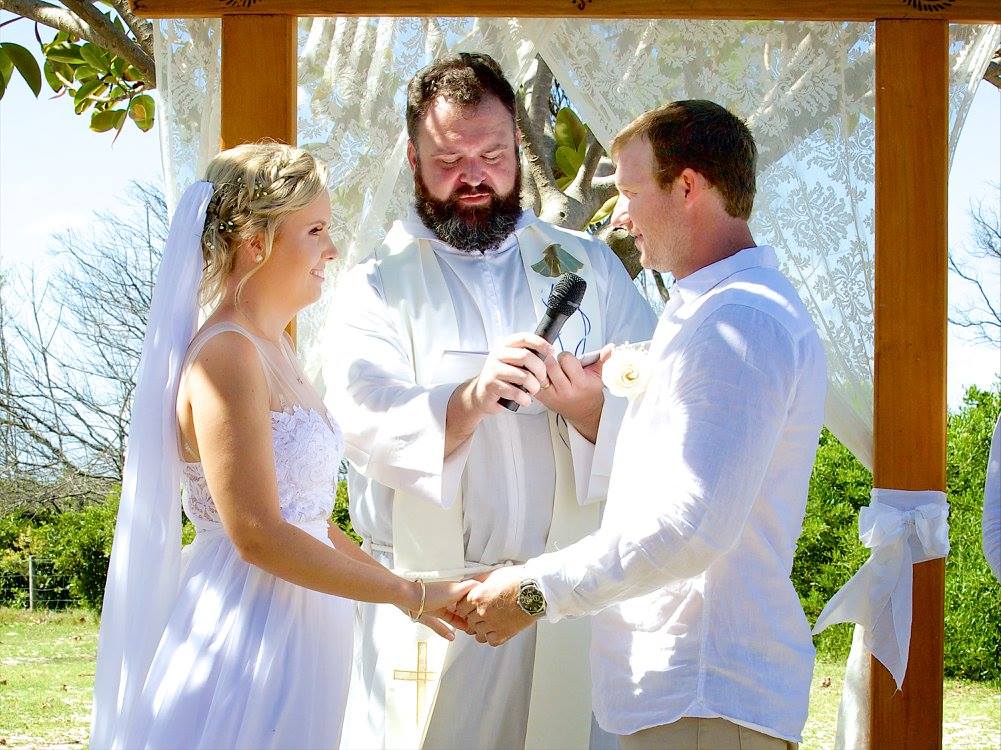
The Rev’d Eron officiating at the wedding of Chantal and Rod – Kingscliff Beach, 2017
Can you tell us a little about your personal faith journey?
I’ve never had a ‘Road to Damascus’ experience as I’ve always felt a connection with God. I grew up in the Church; baptised, confirmed and ordained Anglican. Growing up in the bush and on farms, I developed a deep appreciation of the natural world and for me it was a place I frequently encountered the Divine and to a large extent I still do. I think my connection to the natural world and being exposed to various expressions of Anglicanism, from High Church to Charismatic to Progressive has helped me form a deeply incarnational theology.
How does your faith inspire you and shape your outlook, life choices and character?
My faith, informed and expressed through incarnational theology, holds deeply to the idea of Imago Dei. The image of God can be seen in our brothers and sisters all around us. Furthermore, I hold that God’s fingerprints are all over Creation. Perceiving the Divine all around inspires me and convicts me to work in a range of social justice spaces, including advocating for the environment, for people who are homeless and for gender and sexually diverse people. To me this is sharing the good news of Jesus.
What is your favourite scripture and why?
Micah 6.8 – “What does the Lord require of you? But to pursue justice, love kindness and walk in humility with your God.” This text is so deep. It moves us towards the ‘other’, it assumes community, it encourages faith in action and urges a deeper connection to the Divine. It is about faith in action – making the world a better place.
What person of faith inspires you the most and why?
Two people, one Nelson Mandela and the other my grandfather Ronald Perry. Both were strong men of faith, both very self-contained, and neither fussed about. My grandfather was consistent and had a strong yet gentle presence and deep faith. With Mandela I admire his perseverance through struggles, and his working to better himself and his world.
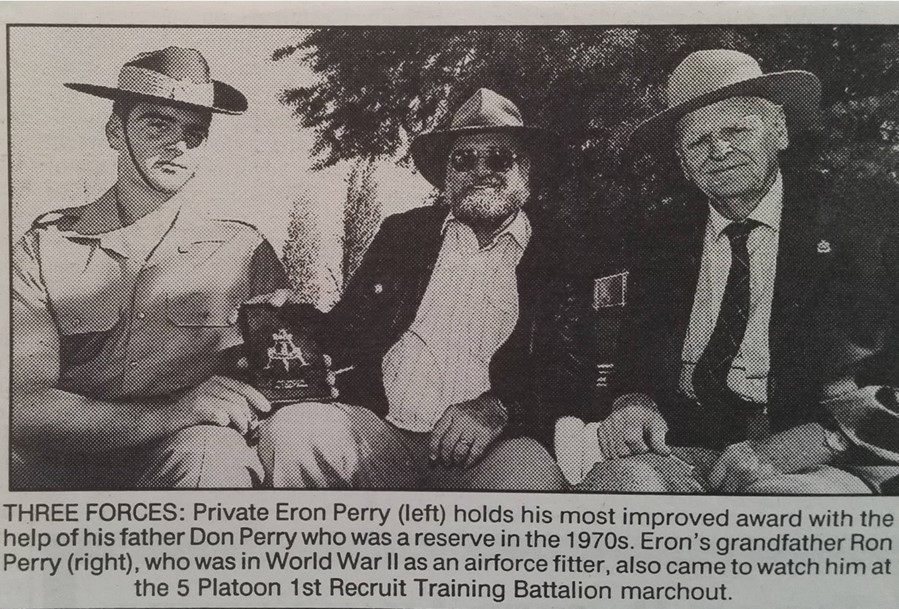
Three generations: Eron Perry, Don Perry and Ronald Perry – Marchout from Army basic training, 1995
What are the primary strengths of the Church and what is the best way to make the most of these for the benefit of our communities?
Community. I think our faith is strongest and most robust when we wrestle and live out our faith with others. I think an exclusively individualised faith is fraudulent. Community allows us to bounce off each other and teaches us to see God in each other. I think that says a lot coming from a natural introvert.
What are the primary challenges currently encountered by the Church and what is the best way to overcome these for the benefit of our communities?
This is the question of this age isn’t it? Our Australian culture and society have changed so dramatically in the last 20 years and the change is getting more intense. On the whole, I do not think the Church has done a very good job of adapting to stay relevant to the communities it finds itself embedded in. We are working hard, but frequently not smart. Massive change is afoot, and COVID-19 is only serving to quicken this inevitable change. Crisis provides opportunity for the agile and wise. I hope we can embrace new ways of doing church, including embracing digital technology and digital communities.
What is the kindest gesture you have ever received or witnessed?
Within the community of faith where I spent my formative teenage years, I witnessed some amazing gestures of love and generosity. I remember there was one very generous couple who purchased a car and anonymously gave it to a young family in need. Even our family was blessed, as my parents were finding it difficult to make ends meet and several times people within our church provided meals and meat trays to help us out.
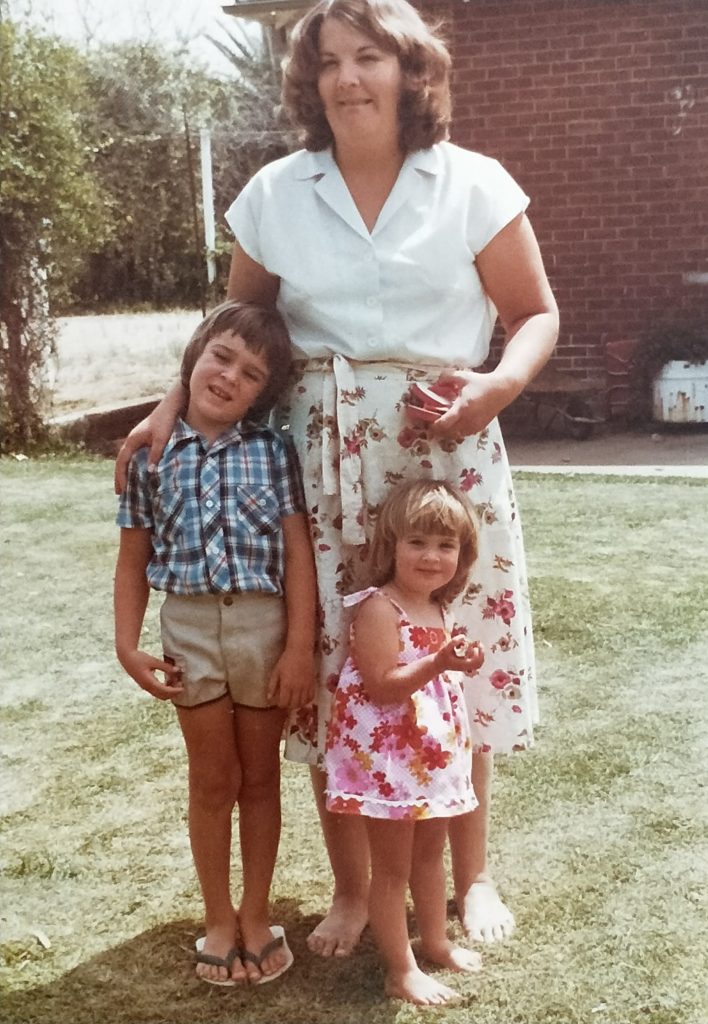
Eron with his Mother and little sister, in Cowra, country NSW, circa 1983
What is the best piece of advice you have ever received and who gave you this advice?
Many years ago, a wise parishioner who had spent her youth traveling to far off lands, such as Afghanistan and Iran, sidled up to me one day as she could see I was having a challenging day. In our conversation she shared the words of an ancient Persian proverb: ‘This too shall pass’. The good times will pass away and the bad times, these too shall pass away. In many aspects it was the first time I had been introduced to mindfulness. Even today it reminds me to savour the good times and not to get lost in the difficult moments of life.
What do you do in your free time to recharge and relax?
I love scuba diving, but I haven’t been for a while with the COVID-19 restrictions. It is just so peaceful under the water and no one can telephone you there! I also really enjoy a good coffee. I’m a coffee snob actually. And truth be told, I don’t mind playing a computer game or two if I get some time on my day off. I also tend my garden, but with no silver bells or cockle shells.
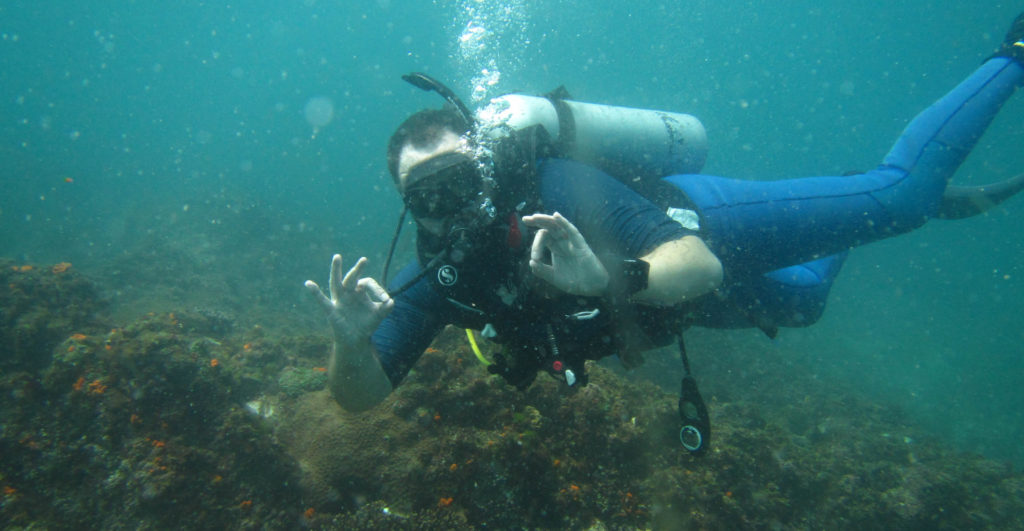
The Rev’d Eron cuba diving off Julian Rocks, Byron Bay in 2017
If you found yourself on a deserted island, what three things would you choose to have with you?
A very large sharp knife, insect spray and a hammock.
What book have you given away most as a gift and why?
Everything Belongs by Richard Rohr. It’s dripping with practical wisdom. And most people seem to find an insight or two that helps them in their everyday lives.
Where do you do your best thinking?
In nature, be it gardening, bush walking or taking photos of the natural world.
If you are having a bad day, what do you do to cheer yourself up?
Not just a bad day routine, but a regular self-care routine is to spend some time in the garden, take time to have a ‘mindful’ coffee, go to the gym to burn off some stress (and calories, as I love my food), and spend some time connecting with loved ones, especially my wife, Jane.
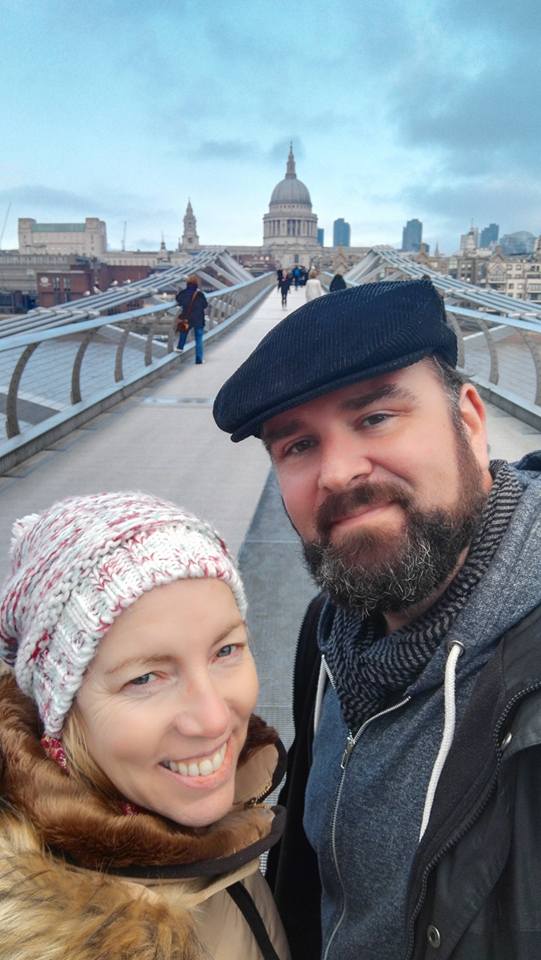
The Rev’d Eron and wife Jane on the Millennium footbridge London, January 2014
What’s your unanswerable question – the question you are always asking yourself?
It’s not a question that I’m always asking myself, but it frequently arises as I prepare sermons and it is, ‘What would the world look like if I and all followers of Jesus put into practice the things he said and did?’

